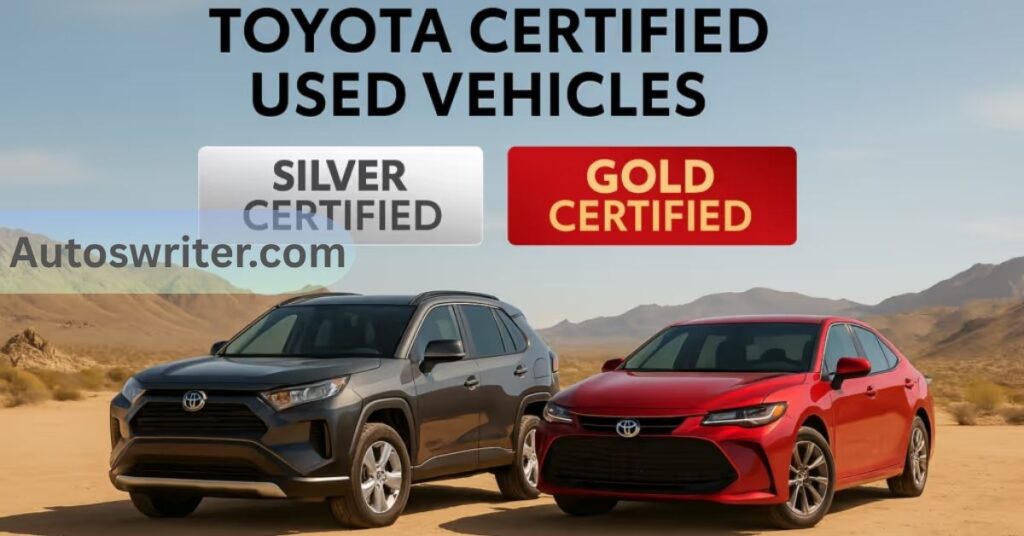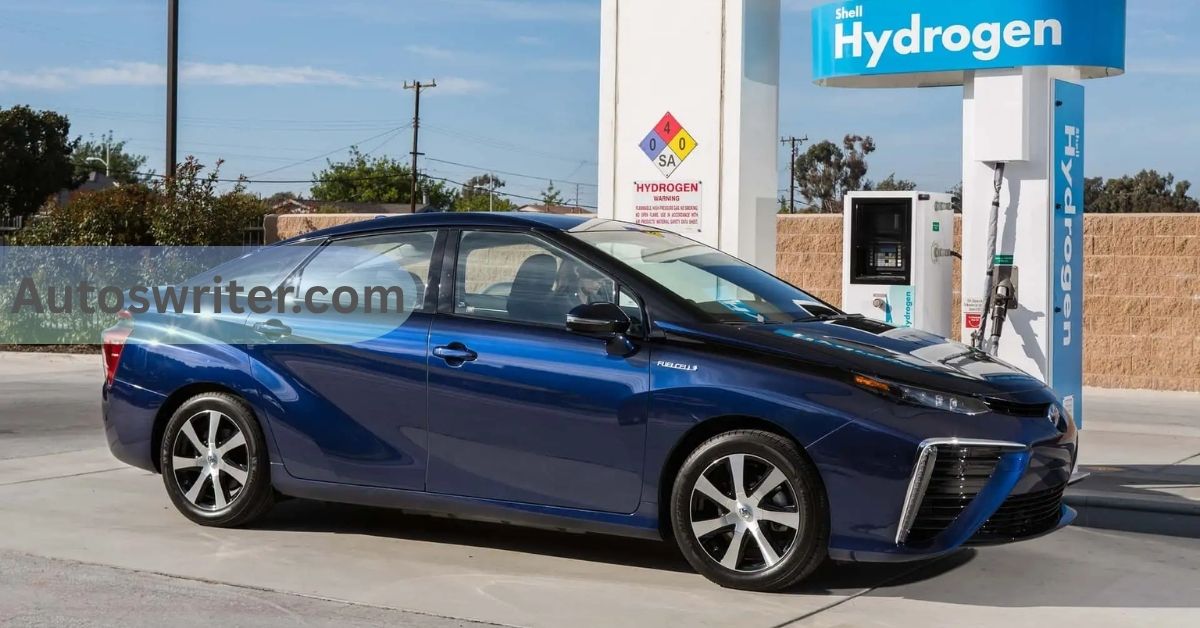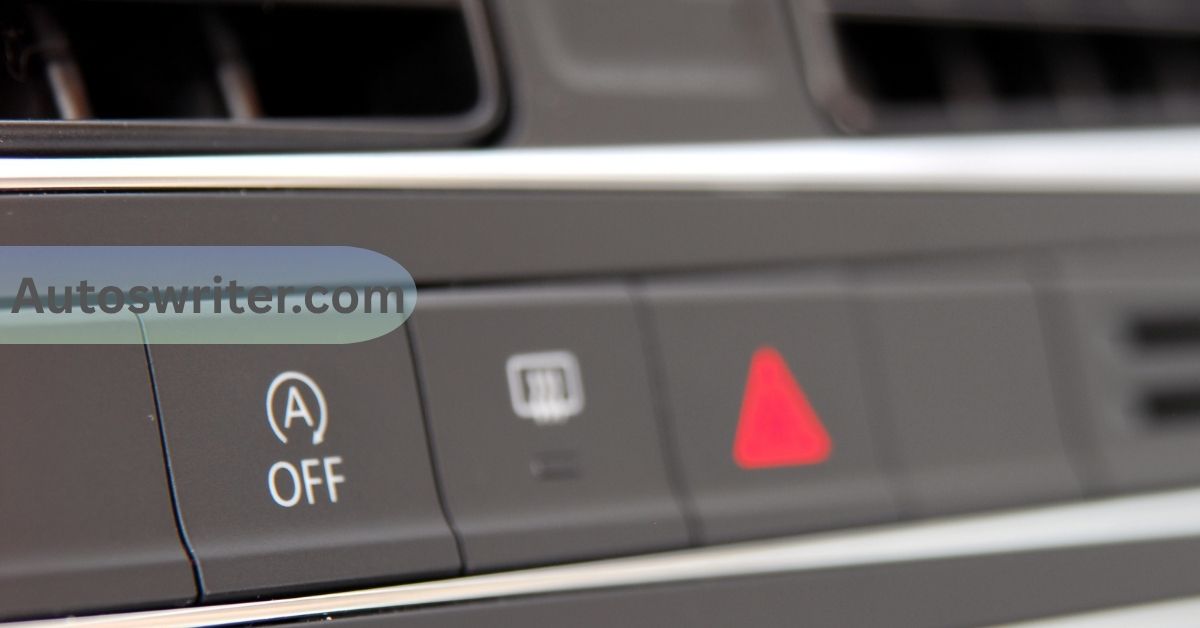A Toyota Gold Certified vehicle is a top-tier Toyota Certified Pre-Owned (CPO) car. In simple terms, it’s a newer used Toyota (up to 6 model years old and under 85,000 miles) that has passed a comprehensive inspection and comes with extra warranties and perks.
Gold-certified vehicles include all the key perks of Toyota’s Certified Pre-Owned (CPO) program. Each one undergoes a 160-point inspection carried out by Toyota-trained professionals. Buyers receive a 12-month or 12,000-mile limited comprehensive warranty plus a 7-year or 100,000-mile limited powertrain warranty.
Additionally, the package includes complimentary 24/7 roadside assistance for up to 7 years or 100,000 miles. These warranties commence from the original in-service date, so the powertrain warranty covers up to 100,000 miles from the date the car was new. If the vehicle is a hybrid, its essential parts (like the high-voltage battery) remain covered under Toyota’s Hybrid System Warranty (often 10 years or 150,000 miles).
Toyota also has a Silver Certified level for older or higher-mileage cars (up to 10 years old, up to 125,000 miles). Gold-certified vehicles are generally newer and have lower mileage than Silver ones, and they come with stronger warranties and stricter Inspection. The table below compares Gold vs. Silver Certified criteria:
| Feature | Toyota Gold Certified | Toyota Silver Certified |
| Vehicle age limit | Up to 6 model years old | Up to 10 model years old |
| Mileage limit | ≤85,000 miles | ≤125,000 miles |
| Inspection | 160-point inspection | 136-point inspection |
| Limited Comprehensive Warranty | 12 mo/12,000 mi | None |
| Limited Powertrain Warranty | 7 yr/100,000 mi | 1 yr/12,000 mi |
| Roadside Assistance | 24/7 for 7 yr/100,000 mi | 24/7 for 12 mo/12,000 mi |
| Other benefits | Transferable warranties, free CARFAX report, special financing | Transferable warranty, CARFAX report |
These official Toyota figures indicate that Gold Certified Toyotas are held to higher standards than Silver Certified ones. Gold-tier vehicles come with a 12-month/12,000-mile comprehensive warranty that covers most parts of the car, along with a 7-year/100,000-mile powertrain warranty.
In contrast, Silver-tier vehicles are backed by a limited one-year powertrain warranty only. Gold cars also receive 7 years of roadside assistance (including flat tyre, tow, and lockout help) compared to just 1 year for Silver. Both levels include a CARFAX history report and allow the warranties to be transferred when you sell the car.
Warranties of Toyota Gold Certified:
A significant benefit of choosing a Gold Certified vehicle is the added warranty protection it provides. Alongside any leftover factory coverage, these vehicles also include:
- 12-month/12,000-mile Limited Comprehensive Warranty: This provides coverage for the majority of vehicle components for up to one year or 12,000 miles after the purchase date, whichever comes first. (It starts from when the car was first delivered as new.)
- 7-Year/100,000-Mile Limited Powertrain Warranty: This covers major engine, transmission, and drivetrain components for 7 years or 100,000 miles from the original in-service date.
- 24-Hour Roadside Assistance (for 7 years/100k): Includes services like towing, lockout service, jump-starts, and fuel delivery.
- Hybrid System Coverage: If the vehicle is a Toyota hybrid, the Toyota Hybrid System Warranty still applies. It covers the hybrid battery pack and related components (typically up to 10 years or 150,000 miles). This means your hybrid’s battery or inverter would be covered under Toyota’s original warranty.
- Transferability: The Gold Certified warranties and roadside assistance transfer at no additional cost to the next owner, adding to the vehicle’s resale value.
These warranties are strictly defined in Toyota’s official policy. The certification booklet shows that Gold Certified coverage runs from the car’s first delivery as new (with “zero miles”). In practice, this means a 7-year/100,000-mile powertrain warranty is measured from the new car’s in-service date.
(Some buyers may think it starts when they buy the CPO car, but it often begins when the vehicle is new.) Roadside assistance is available 24/7 and covers regular, standard breakdown services anywhere in the United States or Canada. Any necessary repairs under warranty have no deductible, and both warranties can be honoured at Toyota dealers nationwide.
In summary, a Gold-Certified Toyota adds an extra year and 12,000 miles of coverage on almost everything, plus an extended powertrain warranty, on top of any remaining new-car coverage. This helps protect you if something goes wrong soon after you buy the used car. It essentially treats the car “almost like new” for the first year and much of its powertrain life.
Also Read: How Long Do Toyota Siennas Last-Complete Lifespan Guide
Rigorous 160-Point Inspection:

Every Toyota Gold Certified vehicle undergoes a strict 160-point inspection and reconditioning process. Only Toyota-certified technicians perform this check. The checklist covers the engine, transmission, brakes, suspension, electronics, body, interior, and more – basically every central system.
For example, technicians verify various components, including engine performance, brake condition, all lights and gauges, heating and air conditioning, and even minor items such as wiper function and horn operation. They also verify the structural integrity and ensure that all factory features function properly.
Notably, the Inspection includes confirming that all keys are present and working (a master key must be on hand). A CARFAX history report is reviewed for accidents or title issues.
Image: Toyota-certified used vehicles are given a thorough 160-point inspection by trained technicians. Every issue found is corrected before certification is issued.
After the Inspection, any needed repairs or touch-ups are made. This reconditioning can include tasks such as replacing worn brake pads, refreshing the paint, repairing dents, or performing any standard maintenance. Toyota’s goal is that every certified vehicle leaves the dealership in like-new condition. One Toyota dealer notes: “Our factory-trained technicians complete any necessary repairs and reconditioning before we call the vehicle certified”.
By contrast, a non-certified used car usually doesn’t get this level of check-up or freshening. Many used vehicles are sold “as-is” (or with only a short dealer warranty) and may only receive a brief safety inspection. Toyota Gold Certified cars, in comparison, must meet fixed standards of condition and are restored to meet these standards. This strict process is a key reason buyers trust CPO cars: every Gold Certified car has undergone a comprehensive Toyota inspection.
Benefits of Buying a Toyota Gold Certified Vehicle:
Choosing a gold-certified Toyota gives you several practical benefits beyond a standard used car. These include:
1. Warranty and Repair Coverage:
You get the extended 12-month/12,000-mile and 7-year/100k warranties already described. These can cover unexpected repairs for up to a year (or more for the drivetrain), which is rare on a non-certified used car.
2. Peace of Mind:
The car has been thoroughly checked and reconditioned, reducing the chance of hidden problems. Toyota even provides a free CARFAX history report so you know its past. This transparency helps avoid “lemon” cars.
3. 24/7 Roadside Assistance:
Gold-certified Toyota owners enjoy seven years of complimentary roadside assistance (towing, jump starts, tyre changes, etc.) at no additional cost. Most used cars do not offer such a service.
4. Trained Technicians:
All work was done by Toyota-certified technicians using genuine Toyota parts. Technicians follow Toyota’s service guidelines to ensure repairs are done correctly.
5. Special Financing:
Toyota often offers attractive financing rates on certified pre-owned models through Toyota Financial Services. These rates can beat standard used-car loans. It’s like financing a new car in some cases.
6. Guaranteed Key Count:
Toyota’s process requires the dealer to have the car’s master key on file. Some dealers claim that this helps ensure you receive all original keys (or a replacement) with the vehicle.
7. Extras:
Sometimes certified vehicles include “new car” extras. For example, a free trial subscription to SiriusXM radio is often added for Gold Certified buyers (though check current offers).
Overall, buyers get a package of warranty, service, and financing benefits with Toyota Gold Certified vehicles. According to Toyota dealers, the main selling points are rigorous Inspection, warranty protection, roadside coverage, certified financing, and a Carfax report. These add up to a more reliable, worry-free used-car purchase.
Toyota Gold Certified vs. Non-Certified Used Cars:
How does Gold Certified Toyotas compare with similar non-certified used cars? There are clear trade-offs:
| Feature | Gold Certified (CPO) | Regular Used Car |
| Multi-point inspection | 160-point by Toyota-trained techs | No standard inspection (varies by seller) |
| Warranty coverage | 12 mo/12k comprehensive + 7 yr/100k powertrain | Usually only any remaining factory warranty or dealer’s short term (if any) |
| Roadside assistance | 7 years/100k with full 24/7 service | Not typically included |
| Financing options | Special low APR rates via Toyota Finance | Standard used-car loan rates |
| Vehicle history report | CARFAX report provided | May not be provided (buyer may have to request it) |
| Price | Higher price (CPO premium) | Lower price (no extra warranty) |
| Peace of mind | High – backed by Toyota, extensive coverage | Lower – more uncertainty about wear & hidden issues |
In practice, a Gold Certified car generally costs more than a comparable non-certified one. Kelley Blue Book notes that “a CPO car will typically cost more than comparable used models”. You pay this premium for the extra assurances. On the other hand, a regular used Toyota (same model/year, similar mileage) might be thousands of dollars cheaper.
The non-certified car might be in fine shape, mainly if sold by a reputable dealer or one-owner owner. But it carries more risk. Used vehicles come as-is more often, and past issues (accidents or poor maintenance) might not be fully disclosed.
The only guarantees might be an impromptu dealer checklist or a short dealer warranty. If something breaks right after purchase, you’d generally have to pay for it yourself. By contrast, with a Gold Certified vehicle, you have factory-backed warranties and know the car was inspected and repaired beforehand.
For many buyers, this extra confidence is worth the higher price. The Toyota CPO program is designed to bridge the gap between a new car and a previously owned one. As one expert writes, the reconditioning and warranties “give buyers confidence and satisfaction”, and many buyers are willing to pay for that.
However, if your budget is tight and you’re a careful shopper (perhaps willing to buy only from sellers with complete, full-service records), a non-certified used car can save you money upfront. The trade-off is that you’d have less coverage and fewer guarantees.
Also Read: Why Is My Tire Pressure Light Blinking Toyota-Complete Guide
Toyota Gold Certified – Pros, Cons, and Real-World Value:

1. Same model, different certification:
Suppose you find a 2019 Camry with 30,000 miles. The Gold Certified version might sell for, say, $2,000–$4,000 more than the same car as a regular used sale. For that extra money, you get extended warranties, roadside service, and assurance that it passed Toyota’s Inspection.
If you value peace of mind and plan to keep the car for several years, the warranties can be a big perk. If you’re confident in a car’s condition or plan to keep it for only a short time, the non-certified model (cheaper by a few thousand dollars) could be just as suitable for your needs.
2. Warranty trade-off:
With the Gold Certified car, even if it’s 2–3 years old, you still have nearly a full year of coverage on all parts, plus the extended powertrain warranty. A non-certified car of the same age would have no additional warranty from Toyota. So, if an expensive repair were to occur (e.g., a transmission issue at 70,000 miles), the Gold Certified buyer would likely have it covered under warranty (if within the terms), whereas the non-certified buyer would pay out of pocket.
3. Financing:
Both options can be financed, but Gold Certified buyers often qualify for the lowest APRs Toyota offers (sometimes as low as current new-car rates). A regular used car can be financed, but usually at higher rates for used vehicles. Over the life of a loan, even a slightly lower rate can save several hundred dollars on interest.
4. Condition and reliability:
Both cars could be mechanically similar (mainly if sold by Toyota dealers). However, the certified one has a formal stamp of approval. In the rare case of a pre-existing problem that the dealer missed, the warranty on the Gold model provides recourse.
5. Resale:
If you resell the car, the Gold Certified status (and its transferable warranty) may enhance its resale value and attract more potential buyers. A non-certified used car might be a harder sell unless it is priced lower.
In short, the benefits of Gold Certification include enhanced protection and greater reassurance. The cons are a higher purchase price. A non-certified car is cheaper but comes with more uncertainty and potential repair costs. Buyers should weigh how much warranty and inspection peace of mind is worth to them.
For some, the added security of Toyota’s CPO warranty and Inspection is well worth the difference; for others, a thorough inspection by a trusted mechanic and a competitive price might be a better value.
Comparison Tables:
| Gold Certified vs Silver Certified | Toyota Gold | Toyota Silver |
| Age Limit | ≤6 years | ≤10 years |
| Mileage Limit | ≤85,000 mi | ≤125,000 mi |
| Inspection Points | 160 points | 136 points |
| Comp. Warranty | 12 mo/12,000 mi | – |
| Powertrain Warranty | 7 yr/100,000 mi | 1 yr/12,000 mi |
| Roadside Assistance | 7 yr/100,000 mi | 1 yr/12,000 mi |
| Other | Transferable coverage, CARFAX report | Transferable coverage, CARFAX report |
| Certified (Gold) vs Non-Certified | Gold Certified Toyota | Regular Used Toyota |
| Multi-point Inspection | 160-pt by Toyota techs | Varies by seller (often only basic checks) |
| Comprehensive Warranty | 12 mo/12k included | None (except any remaining factory coverage) |
| Powertrain Warranty | 7 yr/100k included | None beyond factory coverage |
| Roadside Assistance | 7 yr/100k (24/7) | Not included (or very limited) |
| Financing Rates | Special low-rate financing | Standard used-car rates |
| Vehicle History Report | CARFAX report provided | May not be provided |
| Price | Higher (premium for CPO) | Lower upfront cost |
| Peace of Mind | High – Toyota-backed warranties and checks | Lower – more uncertainty |
Sources: Official Toyota Certified Pre-Owned program materials, Toyota dealer information, and industry research were used to compile these comparisons. All details are based on the current Toyota Certified Pre-Owned (CPO) program rules.
Frequently Asked Questions:
Q1. What does “Toyota Gold Certified” actually mean?
A Toyota Gold Certified vehicle is a pre-owned Toyota (up to 6 years old and with fewer than 85,000 miles) that has passed a 160-point inspection. It includes a 12-month/12,000-mile limited comprehensive warranty, a 7-year/100,000-mile powertrain warranty, and 7 years of roadside assistance. Toyota backs it, and it is only available through participating Toyota dealers.
Q2. How is Gold Certified different from Silver Certified?
Gold-certified vehicles are newer, have lower mileage, and come with more extended warranties than silver-certified cars. Gold models include a 12-month comprehensive warranty and a 7-year powertrain warranty, while Silver models receive a 1-year powertrain warranty and are typically up to 10 years old, with additional mileage allowed.
Q3. Is Toyota Gold Certified worth the extra money?
It depends. If you want the added warranty, detailed Inspection, and roadside help, it can be worth the cost. But if you’re confident in the condition of a non-certified car and don’t mind taking on more risk, a regular used car might save you money.
Q4. Can I finance a Toyota Gold Certified car like a new car?
Yes. Toyota often offers special low-interest financing on Gold Certified cars through its financing arm (Toyota Financial Services). These rates are typically more favourable than standard used car loans and can make the total cost more manageable over time.
Q5. Where can I find a Toyota Gold Certified vehicle?
You can search for Toyota Gold Certified vehicles at official Toyota dealerships or through Toyota’s certified pre-owned inventory page on their website. Each listing should mention “Gold Certified” clearly and include warranty and inspection details.
Conclusion:
A Toyota Gold Certified vehicle is more than just a used car — it’s a carefully inspected and warranty-backed option for buyers who want peace of mind. It includes comprehensive coverage, a detailed 160-point inspection, and additional benefits such as 7-year roadside assistance.
While the cost is usually higher than a regular used car, the added protection, transparency, and support make it a strong option for many buyers. If long-term reliability and reduced risk are priorities, Gold Certified can be a wise choice. Still, every buyer should weigh the warranty value, car condition, and pricing to decide if the extra cost is worth it in their situation.



